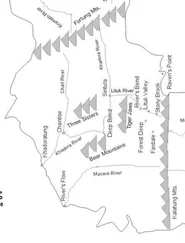parent.
But when it came to predicting fishery yields five years down the causeway, no one was allowed two thousand throws. God wouldn't even spot you two. Extrapolating the graph worked for the first dash or two of the dotted line. But once one began extrapolating upon extrapolation, the whole bloody curve collapsed into fiction.
O'Reilly's idea lay in discarding the search for a set of predictive operators. The realm of real fact did not result from cranking through static functions, no matter how many variables those functions included. The world's events emerged as a resonance, the shifting states of mutually reshaping interactions, each fed back into the other in eternal circulation.
He convinced the Ecotopians with a simple propagation simulation, one that showed just how small the limiting case of complexity could be. He built an island world, sovereign inside its diminutive boundaries. Its entire populace consisted of just two kinds of agents that operated on only two entities, each existing as nothing more than two-dimensional arrays. Each entity came in four flavors and each of the two agents had four possible actions.
Such a market model seemed too brain-dead to generate real interest. But each change in a variable's state updated all the variables that prompted it. Entities influenced agents, and agents created or destroyed entities. Moreover, the application of these feedback loops over time altered the way that variables affected other variables. Not only did the elements of the simulation alter one another. So did the rules of alteration.
Out of this meager sea of ingredients, there issued amazingly lifelike phenomena. Segments of data spoke of saturation, conditioning, habituation, fads, cravings, lemming drop-offs, crash diets, lowest-common-denominationalism, prime time, rushes to the bottom, spontaneous altruism, unsponsored innovation, gratuitous novelty, brand loyalty, brand aging, arms races of acumen and finesse, co-optation, preemption, addiction, dumping… A few iterative, independent, self-modifying procedures created markets as complex as those run by the world at large.
Life was not algorithm. It was ongoing negotiation, a spreading series of overtones. But O'Reilly's cunning simulation presented a problem as large as its promise. Under its simple surface there flowed tide tables of deep intricacy, plumes of intelligence, surges of avarice and hunger that churned in turbulent eddies through the pool of data. How could even the simulation's designer see any one of them in real time? With his static-charting business graphics, O'Reilly could do no more than dredge his dipper into the vat and extract a few test ladles. He foundered on the problem of visualization, snarled at that old investigative impasse like a nineteenth-century neurologist stymied by how to study human thought without slicing into the living brain.
He needed a way to see into four- or six- or eight-dimensional space, even as those several simultaneous data streams unfolded. He needed color, texture, and motion laid on top of the traditional height, width, and depth. O'Reilly even sketched out a fantasy in which musical pitches and timbres let a user track the states of a dozen concurrent agents and actants.
And then he learned of the prototype's existence. Once he discovered the Cavern, no other spot on Mercator's botched projection would do. He needed the tool that only TeraSys could offer him. And the Cavern needed someone who saw what it might be used for. To be able to stand among the lights and sounds, inside the skeins of regenerating prediction too complex to take in any way but viscerally, in one surrounded glance: for such a chance, O'Reilly would give up most anything. And did.
He took the vow of cultural poverty gladly, throwing over his Neanderthal country without a backward glance. Even the vow of silence— the forfeiture of intelligent conversation — cost him little, in light of the potential payoff. Celibacy alone gave him pause. On nights of cold rain, O'Reilly cast about in the sphere of his sleep for the thermally generous Maura, and found only an empty half bed. He cursed her roundly and dug in, waiting for her to see what she was missing.
Meanwhile, his son et lumière show played across the walls of the Cavern as marvelous pure abstraction: a ravishing cityscape at night, seen from miles above, where the eye could pan and zoom through the concerted flares of halogen down to the smallest blush of a back-yard Japanese lantern. It took him weeks to learn how to read the gorgeous, motile tapestry. He forced himself to remember that each of these fantastic, fusing, fractal ice floes meant something — a transaction, an update, a changing variable in the world being modeled. Only when standing in this n-space flux, flanked on all sides by continuously updated data, reading the revelations with his body, thigh to math's thigh, neck-deep in simulation's Humboldt Current, only fully immersed could he begin to sense the cold, delineated meanings that coursed through these oceans of prediction.
This was the work O'Reilly was born for. Mankind's tenure here had come of age. All the Earth's land masses lay prostrate, mapped out to nau-seatingly fine detail. We'd filled the map with knowledge. Now we had a tool with which to look inside. Now the real exploration could begin.
But to date, O'Reilly remained the lone living human who knew how to read this disco-stroboscopic lab report. Everyone else saw little more than an astonishing fireworks show. No matter; the real fireworks weren't yet ready. Much work remained before O'Reilly's pyrotechnic display could lift the veil and lay the future bare.
He'd made some attempt to initiate Rajan Rajasundaran: fellow member of the Decimated Neocolonial Island Club, Sri Lankan by way of Canada, coauthor of ORB, the simulation scripting language that O'Reilly employed to throw his arrays up against the walls of the Cavern. O'Reilly depended on Rajan, invaluable ally, to make the graphics code jump through ever-higher hoops. He kept Rajan on perpetual call for everything from emergency consults to simple sociological shit-shooting.
O'Reilly sought the man out at his favorite haunt, that poor excuse for a pub half a click down the mountain. The place whose inspiration peaked with its choice of name: The Office. As in, "Honey, I'm at The Office." The name worked, in a world that took names for the things they named.
He found Raj sitting in a corner booth, watching a talk show, partaking of the public arena's favorite therapy.
Thank God you've come, Ronan, man. Have a look at this exercise in dissociative schizophrenia, please. Women who tell their husbands, live on camera, that they have lesbian lovers, as brought to you by the Family Ties video salesmen of the Church of Jesus Christ of Latter-Day Saints. I'm afraid I must ask you: who invents all this?
Ah well, Rajan, my son. The Creator's ways are mysterious.
Please explain this phenomenon to me. You are the social scientist, after all.
Has it ever struck you that anyone with the word "scientist" in his job description probably isn't one?
We're all scientists, no? Rajasundaran waved his arms to encompass The Office at large. I mean, every person running this little experiment in being alive?
O'Reilly ordered a beer and a refill for the Sri Lankan. An interesting formulation. But let's start with you. Do you count yourself an empiricist?
Krishna destroy us. You don't really want to know. I'm dead serious, man. What do you believe?
Rajasundaran held out his left hand. His index finger traced a clockwise circle in the air. Then another, quick, counterclockwise. Now what's that supposed to mean? Some sort of mystic Ceylonese bit twiddling?
Читать дальше












